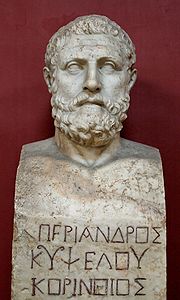
Periander
Encyclopedia

Tyrant
A tyrant was originally one who illegally seized and controlled a governmental power in a polis. Tyrants were a group of individuals who took over many Greek poleis during the uprising of the middle classes in the sixth and seventh centuries BC, ousting the aristocratic governments.Plato and...
of Corinth, Greece in the 7th century BC. He was the son of the first tyrant, Cypselus
Cypselus
Cypselus was the first tyrant of Corinth in the 7th century BC.With increased wealth and more complicated trade relations and social structures, Greek city-states tended to overthrow their traditional hereditary priest-kings; Corinth, the richest archaic polis, led the way...
. Periander succeeded his father in 627 BC. He died in 585 BC.
He upgraded Corinth's port, and built a ramp across the Isthmus of Corinth
Isthmus of Corinth
The Isthmus of Corinth is the narrow land bridge which connects the Peloponnese peninsula with the rest of the mainland of Greece, near the city of Corinth. The word "isthmus" comes from the Ancient Greek word for "neck" and refers to the narrowness of the land. The Isthmus was known in the ancient...
so that ships could be dragged across (the Diolkos
Diolkos
The Diolkos was a paved trackway near Corinth in Ancient Greece which enabled boats to be moved overland across the Isthmus of Corinth. The shortcut allowed ancient vessels to avoid the dangerous circumnavigation of the Peloponnese peninsula...
), avoiding the sea route around the Peloponnese
Peloponnese
The Peloponnese, Peloponnesos or Peloponnesus , is a large peninsula , located in a region of southern Greece, forming the part of the country south of the Gulf of Corinth...
. The money gained from the diolkos allowed Periander to abolish taxes in Corinth. However, Periander was later considered the typical evil tyrant (for example, by Aristotle
Aristotle
Aristotle was a Greek philosopher and polymath, a student of Plato and teacher of Alexander the Great. His writings cover many subjects, including physics, metaphysics, poetry, theater, music, logic, rhetoric, linguistics, politics, government, ethics, biology, and zoology...
). Herodotus
Herodotus
Herodotus was an ancient Greek historian who was born in Halicarnassus, Caria and lived in the 5th century BC . He has been called the "Father of History", and was the first historian known to collect his materials systematically, test their accuracy to a certain extent and arrange them in a...
says he learned his "savagery" from Thrasybulus
Thrasybulus (tyrant)
Thrasybulus was the tyrant of Miletus in the 7th century BC. Under his rule, Miletus fought a lengthy war against Lydia. This war ended without a decisive victor . Following the war, Miletus and Lydia concluded an alliance.Thrasybulus was an ally of Periander, the tyrant of Corinth...
, the tyrant of Miletus
Miletus
Miletus was an ancient Greek city on the western coast of Anatolia , near the mouth of the Maeander River in ancient Caria...
, who instructed Periander to get rid of anyone who could conceivably take power from him. Among his acts were sending young boys from Corcyra to be castrated in Lydia
Lydia
Lydia was an Iron Age kingdom of western Asia Minor located generally east of ancient Ionia in the modern Turkish provinces of Manisa and inland İzmir. Its population spoke an Anatolian language known as Lydian....
(who are reputed to have escaped and be rescued by the Samians), and the murder (and possible necrophiliac rape) of his own wife, Melissa. Abhorrence for this act was so intense that it was described only metaphorically at the time: "Periander baked his bread in a cold oven" (Herodotus
Herodotus
Herodotus was an ancient Greek historian who was born in Halicarnassus, Caria and lived in the 5th century BC . He has been called the "Father of History", and was the first historian known to collect his materials systematically, test their accuracy to a certain extent and arrange them in a...
, V 91-93). Their son Lycophron
Lycophron of Corinth
In Greek history, Lycophron of Corinth was a son of the Corinthian tyrant Periander. He was exiled by Periander in the 7th century BC when he found out Periander had killed his mother Melissa. He refused to return to Corinth unless Periander abdicated. Lycophron was killed by the inhabitants of...
discovered that his father was the murderer, so Periander exiled him from Corinth and forbade any of his subjects to shelter him. Periander later tried to reconcile with Lycophron, but Lycophron refused to return unless Periander abdicated. At this point, Periander declared he would abdicate in favour of Lycophron while he would rule Corcyra; however, the inhabitants of Corcyra killed Lycophron to prevent Periander from arriving.
Periander's nephew Psammetichus succeeded him as tyrant of Corinth but Psammetichus' rule only lasted three years and he was the last of the Cypselid dynasty. Periander was listed by most authors as one of the Seven Sages of Greece
Seven Sages of Greece
The Seven Sages or Seven Wise Men was the title given by ancient Greek tradition to seven early 6th century BC philosophers, statesmen and law-givers who were renowned in the following centuries for their wisdom.-The Seven Sages:Traditionally, each of the seven sages represents an aspect of worldly...
. According to Herodotus
Herodotus
Herodotus was an ancient Greek historian who was born in Halicarnassus, Caria and lived in the 5th century BC . He has been called the "Father of History", and was the first historian known to collect his materials systematically, test their accuracy to a certain extent and arrange them in a...
, Periander also held the musical contest that was won by the poet Arion
Arion
Arion was a kitharode in ancient Greece, a Dionysiac poet credited with inventing the dithyramb: "As a literary composition for chorus dithyramb was the creation of Arion of Corinth," The islanders of Lesbos claimed him as their native son, but Arion found a patron in Periander, tyrant of Corinth...
. Periander invented the Railway albeit horse-drawn, aforementioned as the "Diolkos".

